We may receive a commission when you use our affiliate links. However, this does not impact our recommendations.
I see a lot of workbenches. Lots of them are gorgeous. Many of them are tough. Few benches are both.
Last weekend at Woodworking in America in Pasadena, Calif., I got to use a massive Nicholson-style workbench made by Erik Mortensen, an instructor at Cerritos College. For the most part, the bench is made from the tightest-grain Douglas fir I’ve ever seen. Erik said the material was supposed to be used for some stairs he was going to build for a customer, but the customer backed out. So he built the bench.
It’s a “partner’s bench” – it has two leg vises that use wooden screws with a very clever parallel guide. Instead of a traditional parallel guide with a movable pin, Mortensen’s vises use a second wooden screw at the floor that you spin with your foot.
This isn’t new, but one detail he added is something I’ve never seen: He made the cogged plate that you spin out of brass. It’s beautiful and makes the whole mechanism more elegant. Old ones I’ve seen have a big wooden cogged plate, which has to be recessed into the leg or the chop. Erik’s did not.
There were no end vises on the bench, but he did have plenty of holdfast holes and two pop-up planing stops. Also notable: The entire bench broke down into pieces once you knocked out some wedges.
The most incredible aspect of the bench, however, was the detailing. Virtually every surface, corner, edge or end was embellished with a traditional curve, chamfer or moulding detail. Take a look at the photos below and you’ll see what I mean.
So kudos to Erik for building a world-class bench. Not only did it make it easy for me to do my demonstrations at Woodworking in America, it also was very easy on the eyes.
— Christopher Schwarz
P.S. If you want to see my Nicholson-style workbench, it’s in “Workbenches: From Design and Theory to Construction and Use.”
Here are some supplies and tools we find essential in our everyday work around the shop. We may receive a commission from sales referred by our links; however, we have carefully selected these products for their usefulness and quality.



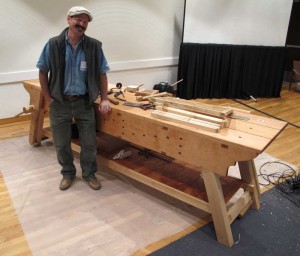

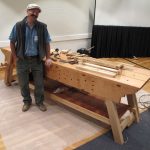
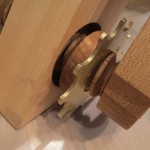
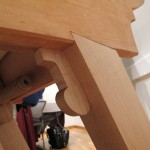
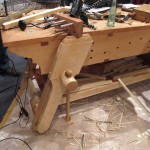




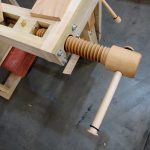
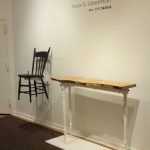
Can you comment on the vise screws? I’m wondering about the wood used, size of screw and threads per inch… but mostly, is that screw dowel showing a bore hole through it? If so, how much and why? Thanks.
Impressive, especially while standing next to it. Fantastic workmanship. Erik is a great person.
Erik, what is the source of the metal bench dogs? I have old ones on my bench that adjust with a screwdriver and they get fouled with shavings and so on; the ones on your bench don’t need a tool to be adjusted and they can’t/won’t get fouled…very nice
I saw that bench…impressive. Beautiful construction, and the DF boards for the top were truly exceptional. Good conference, too! The Gambel house is outstanding, and there was more choice Greene and Greene furniture that you could get close to at the Huntington Library, a special treat. The air was miraculously clear; mountains in view. Pasadena would be a pretty choice place to do some serious yard-saling…
What are those reddish rectangles at the top and bottom of the skirt board?
Fantastic bench! Was nice to see up close, beautiful work Erik!
I saw that bench in person, it really was nice. The adjusters on the vises worked really smoothly too. I can’t believe the top was Fir — it was really fine grained.
Is this a double split top? (Three boards with gaps between them?) That must be a pain to keep flat, but at the same time, give more options for cross grain planing.
Wow, that bench is cool. We readers know that when you are impressed with a bench it’s gonna be pretty awesome. Thanks for sharing. And thanks also for the fabulous profile you did of Roy Underhill in the current issue. Only adds to my desire to someday take a course that you two teach jointly.
Are there any videos of that cogged wheel in action?